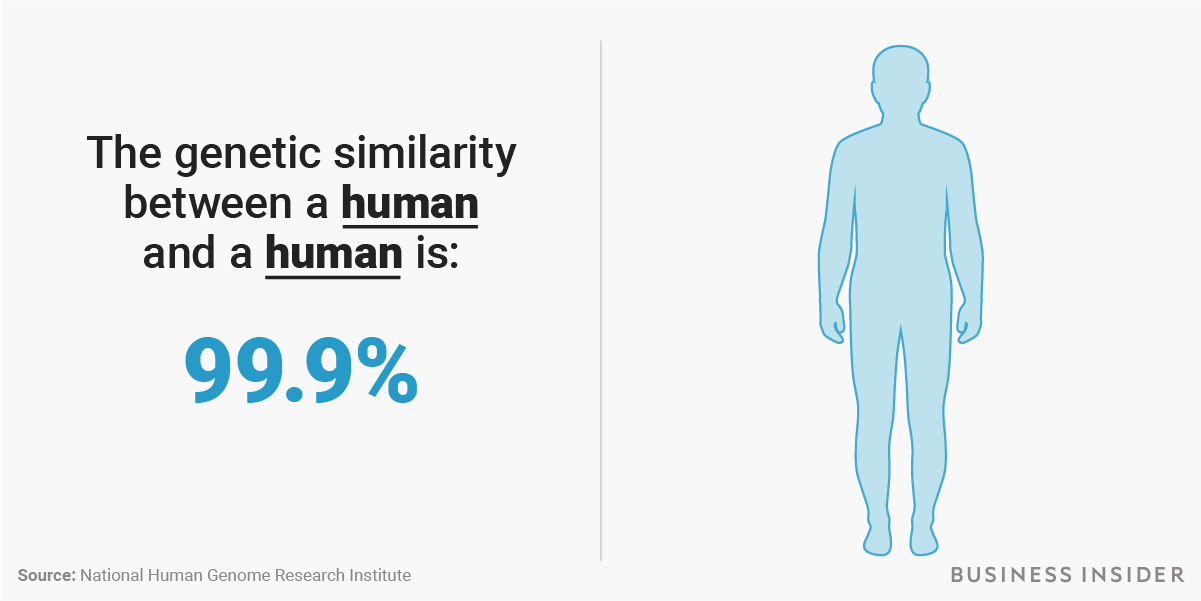Are humans 99.9 percent the same?

Is 99.9 of human DNA the same
Humans are 99.9% identical on a genetic level. The 0.1% difference is caused by insertions, deletions and substitutions in the DNA sequence. These substitutions are known as Single Nucleotide Polymorphisms (SNPs). They occur about every 1000 base pairs.
Are all humans exactly the same
Our physical differences are actually really superficial in terms of genetics. We humans share 99.9% of our DNA with each other! And the 0.1% of DNA that is different between humans doesn't align neatly with race: the concept of race is not backed up by genetics.
What percentage are humans different
Between any two humans, the amount of genetic variation—biochemical individuality—is about . 1 percent. This means that about one base pair out of every 1,000 will be different between any two individuals.
What is the 99 percent of the human genome
The human genome contains roughly 3 billion nucleotides and just under 20,000 protein-coding genes – an estimated 1% of the genome's total length. The remaining 99% is non-coding DNA sequences that don't produce proteins.
Are all humans 99% identical
All human beings are 99.9 percent identical in their genetic makeup. Differences in the remaining 0.1 percent hold important clues about the causes of diseases.
Is DNA 100% correct
Studies have shown that DNA evidence is 99% accurate, making it one of the most foolproof pieces of evidence you can possibly use in court. Like fingerprints, no two people have the same DNA. If a mistake occurs, it's typically because of human error. DNA evidence can greatly alter the outcome of a case.
Are we only half human
“So to our 30 trillion human cells, we have on average about 39 trillion microbial cells. So by that measure, we're only about 43% human,” said Rob Knight, director of the University of California San Diego Center for Microbiome Innovation and professor of pediatrics and computer science and engineering.
Are humans still evolving
Broadly speaking, evolution simply means the gradual change in the genetics of a population over time. From that standpoint, human beings are constantly evolving and will continue to do so long as we continue to successfully reproduce. What has changed, however, are the conditions through which that change occurs.
What percent are all humans identical
99.6 percent identical
99.6. The DNA of any two people on Earth is 99.6 percent identical. But 0.4 percent variation represents about 12 million base pairs, which can explain many of the differences between individuals, especially if the changes lie in key genes. Our environment also contributes to our individuality.
Are humans 100 percent human
Human cells make up only 43% of the body's total cell count. The rest are microscopic colonists. Understanding this hidden half of ourselves – our microbiome – is rapidly transforming understanding of diseases from allergy to Parkinson's.
Is 99.5% the same DNA
The DNA of any two people on Earth is 99.6 percent identical. But 0.4 percent variation represents about 12 million base pairs, which can explain many of the differences between individuals, especially if the changes lie in key genes. Our environment also contributes to our individuality.
What is the same in all humans
The human genome is mostly the same in all people. But there are variations across the genome. This genetic variation accounts for about 0.001 percent of each person's DNA and contributes to differences in appearance and health. People who are closely related have more similar DNA.
Do humans share 97 identical DNA
Our DNA is 99.9% the same as the person next to us — and we're surprisingly similar to a lot of other living things. Our bodies have 3 billion genetic building blocks, or base pairs, that make us who we are.
Is everyone’s DNA the same
The human genome is mostly the same in all people. But there are variations across the genome. This genetic variation accounts for about 0.001 percent of each person's DNA and contributes to differences in appearance and health. People who are closely related have more similar DNA.
Why does DNA test say 99.9 and not 100
High probabilities of 99% and above are commonly seen in DNA paternity testing, but never 100%. This is because results are based on statistical calculations. A result of 100% would only be possible if AlphaBiolabs tested every male of the same ethnicity as the biological father.
Is 98% of our DNA junk
Our genetic manual holds the instructions for the proteins that make up and power our bodies. But less than 2 percent of our DNA actually codes for them. The rest — 98.5 percent of DNA sequences — is so-called “junk DNA” that scientists long thought useless.
Are all humans from Adam
In human genetics, the Y-chromosomal most recent common ancestor (Y-MRCA, informally known as Y-chromosomal Adam) is the patrilineal most recent common ancestor (MRCA) from whom all currently living humans are descended.
Did we all come from one human
Modern humans originated in Africa within the past 200,000 years and evolved from their most likely recent common ancestor, Homo erectus, which means 'upright man' in Latin. Homo erectus is an extinct species of human that lived between 1.9 million and 135,000 years ago.
What will humans look like in 10,000 years
We will likely live longer and become taller, as well as more lightly built. We'll probably be less aggressive and more agreeable, but have smaller brains.
Will humans evolve to fly
? Humans evolving to fly is incredibly unlikely due to our existing physical makeup and the lack of evolutionary benefit. ? Humans are part of the simians, a larger group of primates that includes monkeys, lemurs, and apes.
Are humans ____% identical genetically
In fact, despite our differences on the outside, humans are 99.9% genetically similar to one another.
Is everyone’s DNA identical
Does everybody have the same genome The human genome is mostly the same in all people. But there are variations across the genome. This genetic variation accounts for about 0.001 percent of each person's DNA and contributes to differences in appearance and health.
Are humans 0.01 of all life
humans account for just 0.01% of biomass, so we'd need about 70 trillion of us to match Earth's collective biomass.
Are humans 1 percent monkey
Humans and chimps share a surprising 98.8 percent of their DNA. How can we be so similar–and yet so different
Can you get a 100% DNA match
Comparing the DNA sequence of a child to a parent can identify if one of them was derived from the other. This does not mean that we can achieve a probability of 100%.



0 Comments